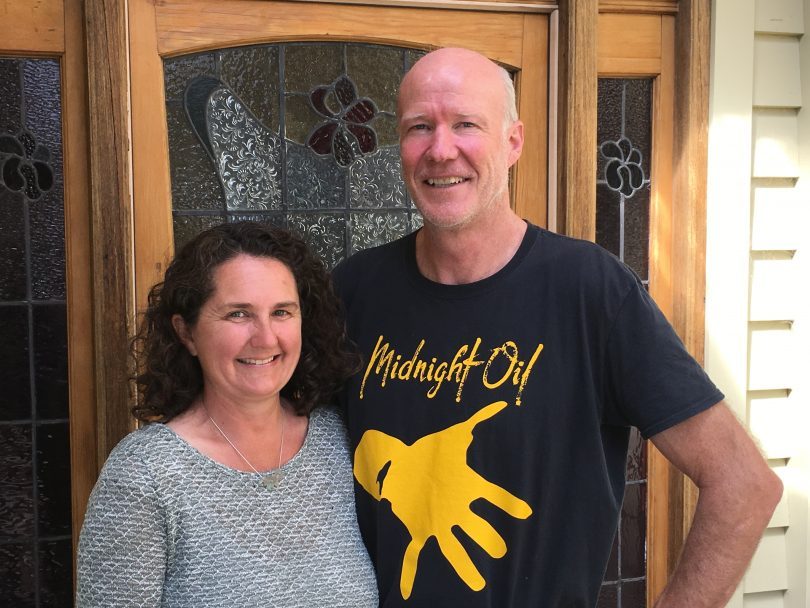
Jo Lane and Warren Atkins at home in Tilba. Photo: Ian Campbell.
Tilba’s Joanne Lane is about to embark on a global journey to investigate the potential and the possibility of seaweed (kelp) farming off the Eurobodalla coast.
Jo and her partner Warren Atkins took over the well established Sea Health Products in 2015. Jo has just been awarded a Yulgilbar Foundation Churchill Fellowship to take the business beyond its hippy origins.
“Betty Long is the original ‘kelp lady’,” Jo says.
“Betty appreciated the significant value of seaweed as part of a healthy, natural diet, combined with regular exercise.
“In 1965, she was diagnosed with what she was told was an incurable circulatory disease and so, battling for her health and life, she moved her family from Sydney to Narooma where her father owned a property at Glasshouse Rocks.
“To aid her health she began including kelp in her diet, but when all she could buy was imported and often stale kelp, she decided to attempt producing her own kelp meal from what she saw being washed up on the beach,” Jo says.
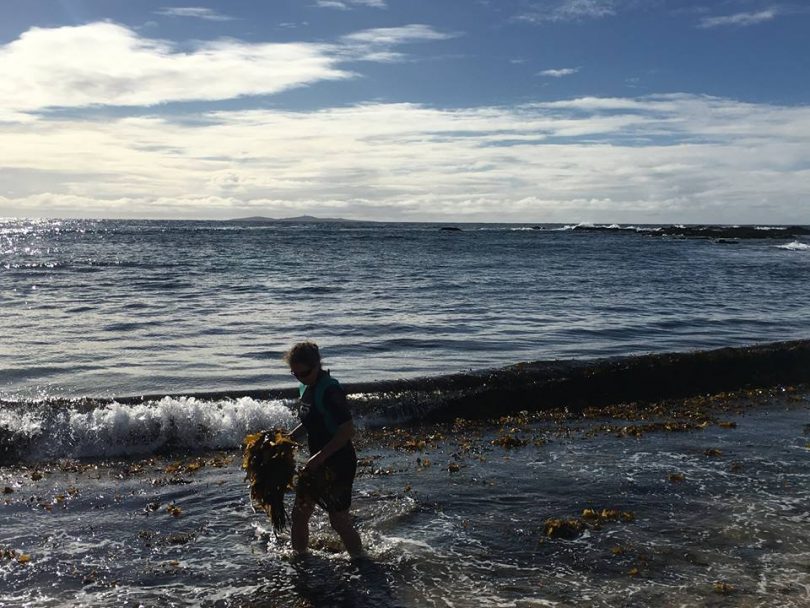
Jo Lane out collecting seaweed. Photo: Sea Health Products Facebook.
Betty passed away in 2004, with Jo and Warren taking over the business three years ago from Betty’s son Scott, who Betty took out of school in his day to help meet the demands of the business.
“At the start, she was just doing it for herself and friends but in 1970 The Australian Women’s Weekly came to Narooma to do a story about her and what she was doing,” Jo says.
“She got right into it and bought a big machine from Melbourne to granulate the seaweed she was collecting from Glasshouse Rocks.”
The Women’s Weekly reported at the time that, “Betty was being bombarded with inquiries from all parts of Australia and as far away as Ethiopia and Japan.”
“Soon she was flat out filling orders,” journalist Kay Keavney wrote.
“Seaweed is a marvellous supplement, rich in iodine and trace minerals, and proteins, and vitamins, and amino acids, and so much more,” Betty told the Women’s Weekly 48 years ago.
“It’s been used by both human beings and animals, especially dogs, for centuries in countries such as Japan, China, Polynesia, New Zealand, Scotland, Ireland, [and] the Continent.”
Jo, who has a background in marine science feels and believes in those health benefits and uses similar techniques to that of Betty and her two children (Anne and Scott) to collect, dry, and process the same seaweed today.
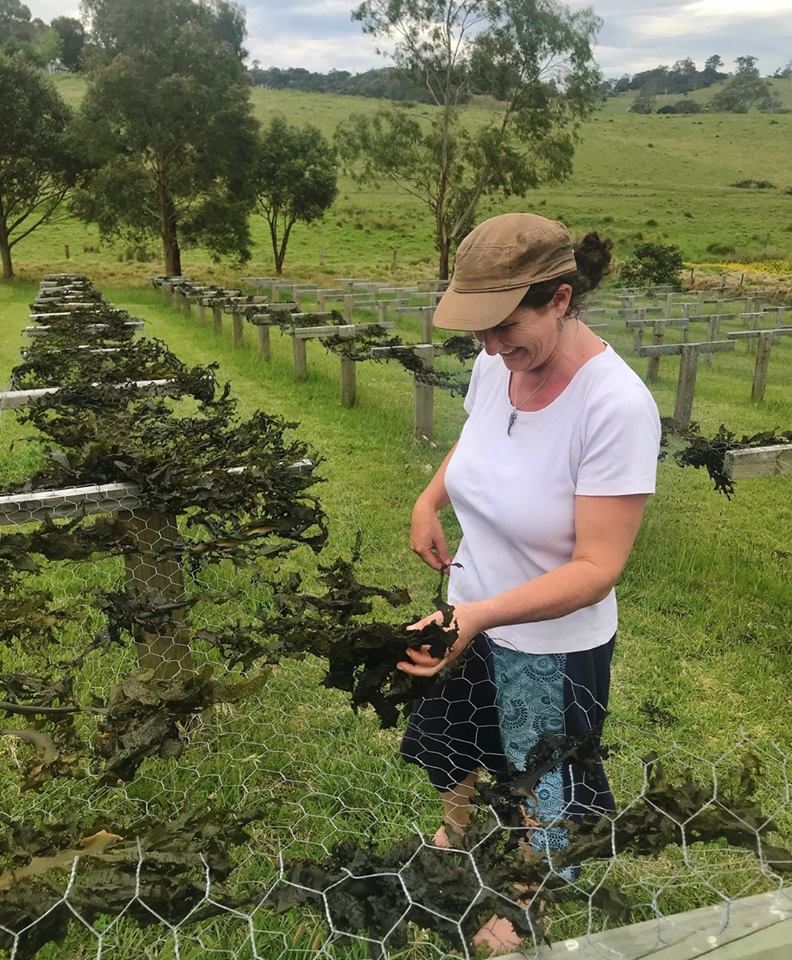
Jo Lane hanging out the morning’s ‘catch’ for drying at Tilba. Photo: Milkwood Facebook.
Tilba is HQ for Sea Health Products these days – Sydney nightclub owner Justin Hemmes snapped up the jaw-dropping founding farm in 2015 for $7.5 million. After collecting seaweed from the property’s 1.5km of beachfront, Betty would dry her ‘catch’ on frames made of chicken-wire strung up in rows on the 60-hectare property.
The process is much the same now for Jo and Warren who have a license to collect seaweed from Far South Coast beaches.
“We get up early most days during summer, make a coffee, hop in the car and go looking for seaweed at Bermagui, Mystery Bay, or Glasshouse Rocks.
“There’s no exact science as to where it’s going to be, you get a bit on an idea, north-easters are good, or big storms.
“We collect it as it comes in on the waves between low tide and high tide, we can’t go and cut it, its got to be beach cast.”
Jo’s vision for the native and abundant Ecklonia seaweed she collects goes beyond food and health supplements.
“Looking at what’s happening overseas kelp is not just useful as a food, it’s being used in cosmetics, in agricultural feed, fertilisers, biogas, and combating climate change,” Jo says.
“To investigate and be a part of introducing kelp farming would be very satisfying.”
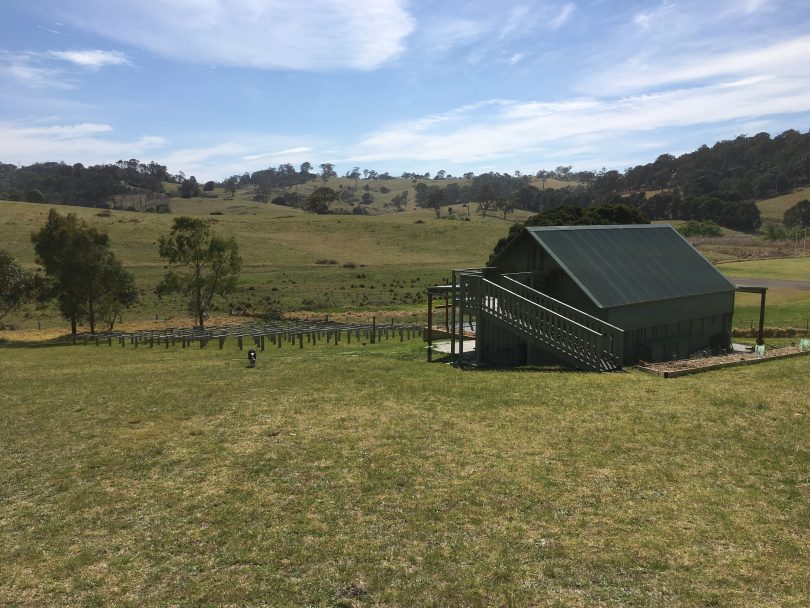
The Tilba HQ of Sea Health Products. Photo: Ian Campbell.
It’s a vision the Churchill Trust and Yulgilbar Foundation has invested in with Jo set to travel to the USA, Canada, Norway, and Scotland next year to further her research.
Apart from creating sustainable local employment opportunities, Jo says, “There are so many pluses to kelp farming – no fertilisers, no fresh water, it captures carbon, it increases biodiversity, it produces an amazingly versatile product.”
“The Churchill Fellowship will allow us to travel and meet with kelp farmers who are already doing this and have been doing it for ten-fifteen years.
“We will bring all that information and ideas back here. There are no ocean-based kelp farms in Australia, this hasn’t been done before so it won’t happen straight away, there’s a lot to work through.”
When she imagines a future kelp farm at sea off the Far South Coast Jo sees it working in with other aquaculture enterprises.
“Visually it would look just like the mussel farm at Eden, all the action is underwater.”
“You grow it in the lab and then go and put it on ropes and come back six months later and pull it in.
“At the moment we go out driving and might not come home with anything, this would be a lot more reliable and we could factor in staff to help with the processing.”
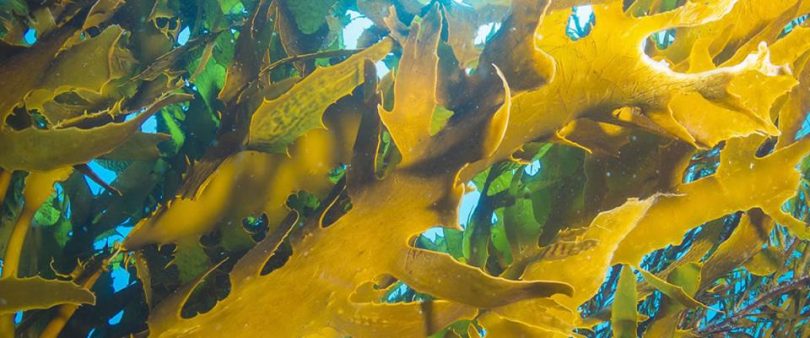
Eckolonia likes cooler waters and can be found from Bryon Bay to Tasmania and South Australia. Photo: Sea Health Products Facebook.
Jo and Warren take off in winter next year after a busy summer of collecting seaweed. Jo says she is very grateful for the opportunity and has been inspired by recent local events to run with it – including the 2017 visit by Professor Tim Flannery from the Climate Council.
“I went to see Tim Flannery speak in Bega and he started talking about kelp farming as a way of drawing carbon out of the atmosphere and I just thought – wow!”
“He is suggesting covering 9 per cent of the world’s oceans with kelp farms to mitigate climate change.
“I contacted him after and said you have inspired me and got a nice reply, but I should let him know now that I’ve got the Churchill.”
Jo also points to Bega carpenter, woodwork teacher, and recent Churchill Fellow Jo Saccomani as adding to her can-do attitude as well as September’s Festival of Open Minds in Bega.
In the meantime, the beautiful grind of collecting seaweed and bringing it back for washing, drying, and processing as a food supplement continues at Tilba.
“I just love serving all those old customers of Betty’s and seeing new people switch on to the health benefits.
“People use it like a general multi-vitamin, people swear by it for their arthritis and the CSIRO say it’s good for digestion and gut health, and athletes say it helps with muscle recovery.
“It’s really easy to add into any food, and if you forget or can’t take it for a while you start to notice the difference in how you feel.”
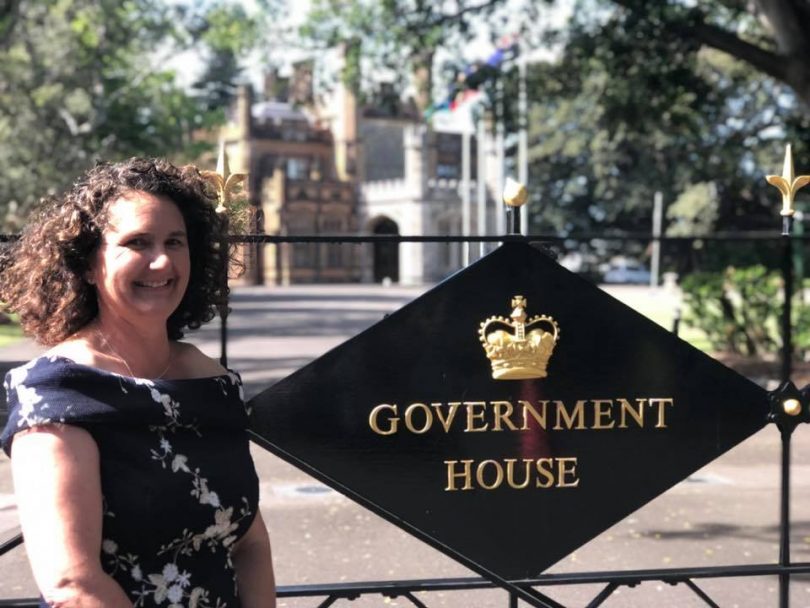
Jo Lane at Government House in Sydney for the Churchill Fellowship presentation. Photo: Sea Health Products Facebook.
Jo’s smoked Golden Kelp granules recently won bronze at the Sydney Fine Food Awards.
“Our smoked kelp is perfect sprinkled on eggs, salads, tomatoes, and compliments loads of dishes.”
Jo says the Long family is very excited to hear of the growth and new directions of what was their family business.
“They are very happy that Betty’s legacy is continuing and that I am using my science background to go in new directions with it.”
Original Article published by Ian Campbell on About Regional.












